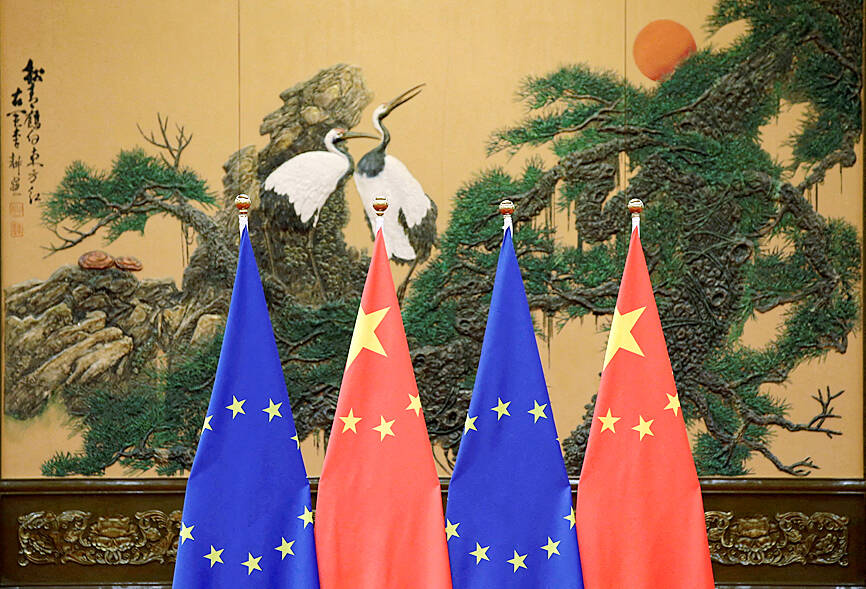The EU is cracking down on Chinese biodiesel imports after investigating complaints that a flood of unfairly priced renewable fuel is undercutting producers in the bloc and hurting workers.
The EU has already set provisional duties for electric vehicles made in China over what it sees as unfair subsidies in its most high-profile case.
The European Commission would impose provisional anti-dumping duties on Chinese imports of biofuels in four weeks, ranging from 12.8 percent to 36.4 percent, the European Biodiesel Board (EBB) said in a statement, citing a document from regulators.

Photo: REUTERS
“Our European businesses have been suffering for far too long under the pressure of unfairly priced Chinese imports and we are very happy to see the European Commission take action,” EBB president Dickon Posnett said.
The finding comes as EU fuel producers worry about being undermined by companies in Asia that are possibly mixing fuels with cheaper ingredients and then mislabeling them to qualify for incentives outlined by the 27-nation bloc’s renewable energy targets.
Chinese companies exported 1.8 million tonnes of biodiesel to the EU last year, 90 percent of all Chinese biodiesel exports, the EBB said.
Similar concerns have taken hold in the US, where business groups are urging US President Joe Biden’s administration to boost levies on Chinese used cooking oil used to make low-carbon fuels.
The duties would be positive for EU producers, although the region has built up an ample supply of biodiesel that any immediate impacts could be muted, Bloomberg Intelligence analyst Brett Gibbs said.
The EBB, which represents European biodiesel producers and filed its complaint over Chinese biodiesel last year, said on Friday that it is “gravely concerned” that the EU did not include Chinese sustainable aviation fuel in the anti-dumping measures. The group said it would address the matter with regulators as a top priority.

When an apartment comes up for rent in Germany’s big cities, hundreds of prospective tenants often queue down the street to view it, but the acute shortage of affordable housing is getting scant attention ahead of today’s snap general election. “Housing is one of the main problems for people, but nobody talks about it, nobody takes it seriously,” said Andreas Ibel, president of Build Europe, an association representing housing developers. Migration and the sluggish economy top the list of voters’ concerns, but analysts say housing policy fails to break through as returns on investment take time to register, making the

‘SILVER LINING’: Although the news caused TSMC to fall on the local market, an analyst said that as tariffs are not set to go into effect until April, there is still time for negotiations US President Donald Trump on Tuesday said that he would likely impose tariffs on semiconductor, automobile and pharmaceutical imports of about 25 percent, with an announcement coming as soon as April 2 in a move that would represent a dramatic widening of the US leader’s trade war. “I probably will tell you that on April 2, but it’ll be in the neighborhood of 25 percent,” Trump told reporters at his Mar-a-Lago club when asked about his plan for auto tariffs. Asked about similar levies on pharmaceutical drugs and semiconductors, the president said that “it’ll be 25 percent and higher, and it’ll

NOT TO WORRY: Some people are concerned funds might continue moving out of the country, but the central bank said financial account outflows are not unusual in Taiwan Taiwan’s outbound investments hit a new high last year due to investments made by contract chipmaker Taiwan Semiconductor Manufacturing Co (TSMC, 台積電) and other major manufacturers to boost global expansion, the central bank said on Thursday. The net increase in outbound investments last year reached a record US$21.05 billion, while the net increase in outbound investments by Taiwanese residents reached a record US$31.98 billion, central bank data showed. Chen Fei-wen (陳斐紋), deputy director of the central bank’s Department of Economic Research, said the increase was largely due to TSMC’s efforts to expand production in the US and Japan. Investments by Vanguard International

WARNING SHOT: The US president has threatened to impose 25 percent tariffs on all imported vehicles, and similar or higher duties on pharmaceuticals and semiconductors US President Donald Trump on Wednesday suggested that a trade deal with China was “possible” — a key target in the US leader’s tariffs policy. The US in 2020 had already agreed to “a great trade deal with China” and a new deal was “possible,” Trump said. Trump said he expected Chinese President Xi Jinping (習近平) to visit the US, without giving a timeline for his trip. Trump also said that he was talking to China about TikTok, as the US seeks to broker a sale of the popular app owned by Chinese firm ByteDance Ltd (字節跳動). Trump last week said that he had